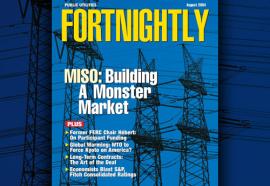People
(October 2005) Xcel Energy named Jacob P. Mercer assistant treasurer for the utility and its operating subsidiaries. Portland General Electric appointed Bill Valach director of investor relations. Federal Energy Regulatory Commission Chairman Joseph T. Kelliher appointed John S. Moot as the commission's general counsel. PJM Interconnection has realigned responsibilities among five executives. And others...








